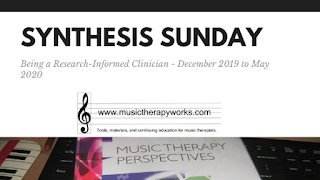Synthesis Sunday: Diving Into Winnicotts's Theory of the Parent-Infant Relationship
Whoo-ee. I haven't made it through the first sentence of this article without having to reach for my dictionary. I'm thinking this will be a long synthesis - mainly because I am not all that up on psychoanalytical paradigm jargon.
As I scan through the article that I've selected, (citation below if you want to read this with me) I think my new first step is to scan through, identify all the terminology that is unfamiliar to me, and then take the time to define that terminology so I can then read the article with some context of what is being said.
Now, admitting that I don't know what is being said is a HUGELY humiliating thing for me to do. I pride myself on my intelligence and my mastery of vocabulary and of music therapy concepts. When I come across the world of psychoanalytic music therapy, however, my mind starts to shut down because I just do not understand what is being said. These are the times when my behaviorist/humanistic/sensory integration background come to the forefront in a way that just takes over.
I am trying to expand my views and knowledge, and I feel that Winnicott is important for this evolution, so off to a vocabulary list!
I am going to scan the article and write down every word, term, or concept that I am unfamiliar with so I can define it and try to gain some context. Here I go...
So, diving into Winnicott seems to be an interesting evolutionary step for me this year - I'm not ever certain about Freud and his thoughts about things, but forcing myself into this sort of thought with a 21st century, behavioristic, humanistic, and sensory integrative type philosophy and practice format will enrich my understanding of what others are saying to me about all this stuff. I know there is important information here for me, but trying to figure it out may take a very long time.
Sigh.
Off to the dictionary.
Winnicott, D.W. (1960). The Theory of the Parent-Infant Relationship1. Int. J. Psycho-Anal., 41:585-595
As I scan through the article that I've selected, (citation below if you want to read this with me) I think my new first step is to scan through, identify all the terminology that is unfamiliar to me, and then take the time to define that terminology so I can then read the article with some context of what is being said.
Now, admitting that I don't know what is being said is a HUGELY humiliating thing for me to do. I pride myself on my intelligence and my mastery of vocabulary and of music therapy concepts. When I come across the world of psychoanalytic music therapy, however, my mind starts to shut down because I just do not understand what is being said. These are the times when my behaviorist/humanistic/sensory integration background come to the forefront in a way that just takes over.
I am trying to expand my views and knowledge, and I feel that Winnicott is important for this evolution, so off to a vocabulary list!
I am going to scan the article and write down every word, term, or concept that I am unfamiliar with so I can define it and try to gain some context. Here I go...
- psycho-analytic transference - I have a vague idea of transference, but what makes this psycho-analytic - are there other types??
- ego-control
- alterative interpretations
- terms of projection (only in the second paragraph here)
- mechanisms of repression
- Freudian term - primary repression
- "Primitive Emotional Development"
- traumata - plural for something trauma-related??
- An entire sentence - "It may even happen that he is able to accept what is good in the environment as a projection of the simple and stable going-on-being elements that derive from his own inherited potential." Do you ever have moments when you can understand each word individually, but not when they are put together??
- recognition of a true "not-me"
- pleasure-principle to the reality-principal
- psychical system
- manifestations of discharge
- psychical detachment (almost to the end of page two - ugh!)
- id-forces
- pregenital sexuality (definitely a Freudian framework)
- instinct tension
- anxiety about annihilation
- primitive anxieties
- first stages of mental organization (splitting, projection, and introjection)
- inherited potential (I'm getting through this scanning a bit more quickly now - less jargon and new concepts and more language I recognize!)
- disintegration
- psychosomatic existence
- psyche indwelling in the soma
- orgiastic functioning of the erotogenic zones
- defusion
- hiding of the core of the personality
- projective identification
- parturition
So, diving into Winnicott seems to be an interesting evolutionary step for me this year - I'm not ever certain about Freud and his thoughts about things, but forcing myself into this sort of thought with a 21st century, behavioristic, humanistic, and sensory integrative type philosophy and practice format will enrich my understanding of what others are saying to me about all this stuff. I know there is important information here for me, but trying to figure it out may take a very long time.
Sigh.
Off to the dictionary.
Winnicott, D.W. (1960). The Theory of the Parent-Infant Relationship1. Int. J. Psycho-Anal., 41:585-595


Comments
Post a Comment